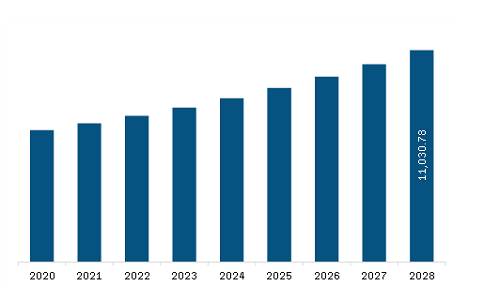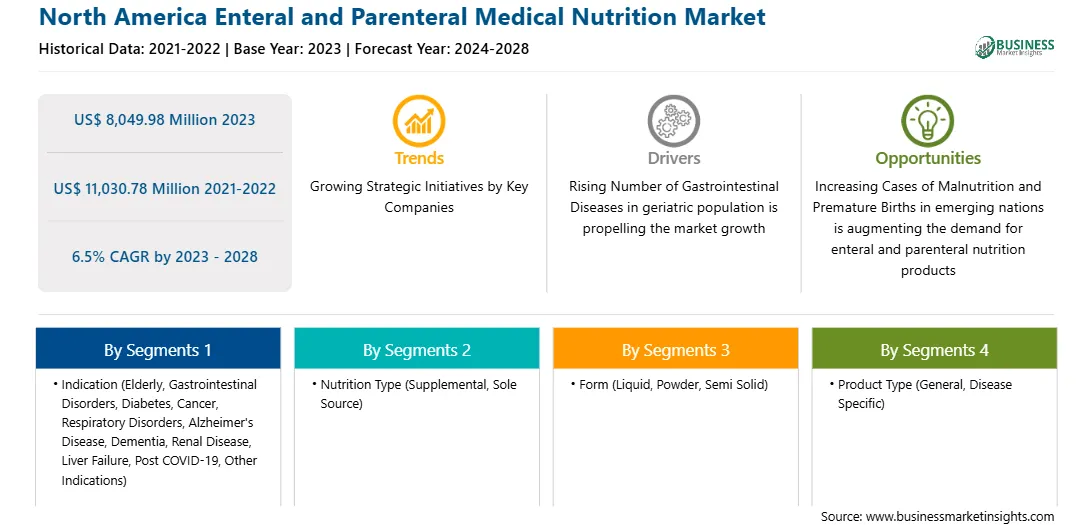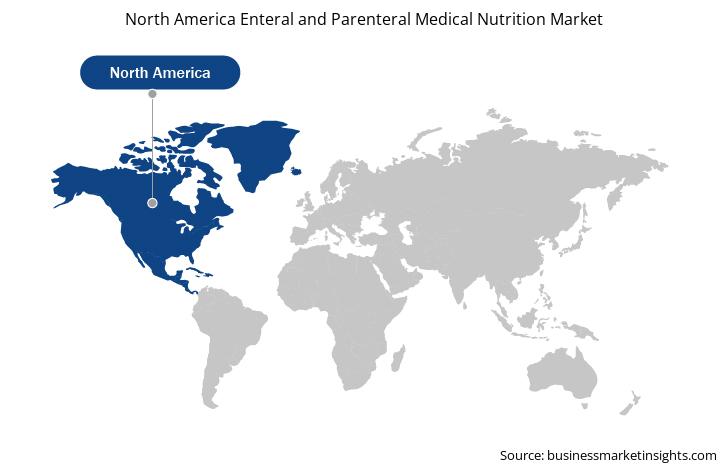Crohn’s disease, bowel obstruction, ulcerative colitis, short bowel syndrome, microscopic colitis, and certain cancers are a few examples of gastrointestinal diseases.
Based on the Global Burden of Disease Study 2019, ~4.9 million cases of inflammatory bowel disease (IBD) were recorded worldwide in 2019; China (911,405) and the US (762,890) had the highest number of cases, with prevalence of 66.9 and 245.3 cases per 100,000 people, respectively. Crohn’s disease and ulcerative colitis are two of the commonly diagnosed IBDs. Crohn’s disease is a complex, chronic disorder primarily affecting the digestive system. It is the most common disease in North America. Moreover, short bowel syndrome (SBS) occurs in ~3 per 1 million people yearly. As per the article titled “Understanding Short Bowel Syndrome: Current Status and Future Perspectives," published in 2020, the prevalence of SBS has increased by more than twofold in the last 40 years. The prevalence was ~30 cases per million in the US.
Patients with gastrointestinal diseases are at an elevated risk of nutritional deterioration as they are asked to fast before undergoing diagnostic tests. They may also face nutritional deterioration due to therapeutic dietary restriction and loss of appetite caused by anorexia or altered nutritional requirement, which can be a result of the disease itself. Thus, medical nutrition is recommended for gastrointestinal disease patients as these patients cannot ingest food. Thus, the enteral and parenteral routes are preferred to provide them with essential nutrients. Enteral feeding refers to food nutrition intake directly through the mouth or through a tube that passes the digestive tract (mouth to stomach/small intestine and then anus). This type of nutrition is preferred to provide treatment support for patients suffering from chronic ailments, such as neurological disorders, gastrointestinal diseases, and inherited metabolic diseases. Some people may not show compatibility toward tube insertion, which makes meeting their calorie and nutrient needs difficult. In such cases, parenteral nutrition is preferred to ensure their bodies remain hydrated and meet the calorie and other nutrient intake required to maintain physical well-being and function. Parenteral nutrition is indicated when patients cannot meet their nutritional needs due to diseases, such as cancer and chronic diseases affecting the gastrointestinal tract. This type of nutrition is the cornerstone of therapy for most patients with severe SBS. Therefore, the elevating prevalence of gastrointestinal diseases drives the growth of the North America enteral and parenteral medical nutrition market.
The enteral and parenteral medical nutrition market in North America has been segmented into the US and Canada. The US held a larger share of the market in 2022. The rising prevalence of chronic diseases, growing strategic developments by market players, and increasing preference for enteral and parenteral nutrition contribute to the market progress in this region. Moreover, an upsurge in knowledge among individuals about the benefits of medical nutrition, such as tube feeding, in the treatment of chronic health conditions further contributes to the market growth.
Strategic insights for the North America Enteral and Parenteral Medical Nutrition provides data-driven analysis of the industry landscape, including current trends, key players, and regional nuances. These insights offer actionable recommendations, enabling readers to differentiate themselves from competitors by identifying untapped segments or developing unique value propositions. Leveraging data analytics, these insights help industry players anticipate the market shifts, whether investors, manufacturers, or other stakeholders. A future-oriented perspective is essential, helping stakeholders anticipate market shifts and position themselves for long-term success in this dynamic region. Ultimately, effective strategic insights empower readers to make informed decisions that drive profitability and achieve their business objectives within the market. The geographic scope of the North America Enteral and Parenteral Medical Nutrition refers to the specific areas in which a business operates and competes. Understanding local distinctions, such as diverse consumer preferences (e.g., demand for specific plug types or battery backup durations), varying economic conditions, and regulatory environments, is crucial for tailoring strategies to specific markets. Businesses can expand their reach by identifying underserved areas or adapting their offerings to meet local demands. A clear market focus allows for more effective resource allocation, targeted marketing campaigns, and better positioning against local competitors, ultimately driving growth in those targeted areas.
North America Enteral and Parenteral Medical Nutrition Strategic Insights

North America Enteral and Parenteral Medical Nutrition Report Scope
Report Attribute
Details
Market size in 2023
US$ 8,049.98 Million
Market Size by 2028
US$ 11,030.78 Million
Global CAGR (2023 - 2028)
6.5%
Historical Data
2021-2022
Forecast period
2024-2028
Segments Covered
By Indication
By Nutrition Type
By Form
By Product Type
By Route of Administration
Regions and Countries Covered
North America
Market leaders and key company profiles
North America Enteral and Parenteral Medical Nutrition Regional Insights

North America Enteral and Parenteral Medical Nutrition Market Segmentation
The North America enteral and parenteral medical nutrition market is segmented into indication, nutrition type, form, product type, route of administration, age group, and distribution channel, and country.
Based on indication, the North America enteral and parenteral medical nutrition market is segmented into elderly, gastrointestinal disorders, diabetes, cancer, respiratory disorders, alzheimer’s disease, dementia, renal disease, liver failure, post covid-19, and other indications. The elderly segment held the largest share of the North America enteral and parenteral medical nutrition market in 2023. Gastrointestinal disorders are segmented into IBD, IBS, and others.
Based on nutrition type, the North America enteral and parenteral medical nutrition market is segmented into supplemental and sole source. The supplemental segment held a larger share of the North America enteral and parenteral medical nutrition market in 2023.
Based on form, the North America enteral and parenteral medical nutrition market is segmented into liquid, powder, and semi solid. The liquid segment held the largest share of the North America enteral and parenteral medical nutrition market in 2023.
Based on product type, the North America enteral and parenteral medical nutrition market is segmented into general and disease specific. The general segment held the largest share of the North America enteral and parenteral medical nutrition market in 2023.
Based on route of administration, the North America enteral and parenteral medical nutrition market is segmented into oral, tube feed, and parenteral. The parenteral segment held the largest share of the North America enteral and parenteral medical nutrition market in 2023.
Based on age group, the North America enteral and parenteral medical nutrition market is segmented into above 60 years, 18-60 years, 3-18 years, and below 3 years. The above 60 years segment held the largest share of the North America enteral and parenteral medical nutrition market in 2023.
Based on distribution channel, the North America enteral and parenteral medical nutrition market is segmented into a hospital pharmacies, retail stores, e-commerce, and others. The hospital pharmacies segment held the largest share of the North America enteral and parenteral medical nutrition market in 2023
Based on country, the North America enteral and parenteral medical nutrition market is segmented into the US, and Canada. The US dominated the share of the North America enteral and parenteral medical nutrition market in 2023.
Abbott Laboratories; B. Braun SE; Baxter International Inc; Fresenius Kabi AG; Medica Nutrition Inc; Medtrition Inc; Nestle SA; Nutricia International BV; and Nutrisens SAS are some of the leading companies operating in the North America enteral and parenteral medical nutrition market.
The North America Enteral and Parenteral Medical Nutrition Market is valued at US$ 8,049.98 Million in 2023, it is projected to reach US$ 11,030.78 Million by 2028.
As per our report North America Enteral and Parenteral Medical Nutrition Market, the market size is valued at US$ 8,049.98 Million in 2023, projecting it to reach US$ 11,030.78 Million by 2028. This translates to a CAGR of approximately 6.5% during the forecast period.
The North America Enteral and Parenteral Medical Nutrition Market report typically cover these key segments-
The historic period, base year, and forecast period can vary slightly depending on the specific market research report. However, for the North America Enteral and Parenteral Medical Nutrition Market report:
The North America Enteral and Parenteral Medical Nutrition Market is populated by several key players, each contributing to its growth and innovation. Some of the major players include:
The North America Enteral and Parenteral Medical Nutrition Market report is valuable for diverse stakeholders, including:
Essentially, anyone involved in or considering involvement in the North America Enteral and Parenteral Medical Nutrition Market value chain can benefit from the information contained in a comprehensive market report.